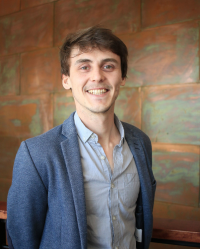Dorian Gaboriau, a doctoral student at Université du Québec en Abitibi-Témiscamingue (UQAT), has been awarded a US$5,000 grant from the National Geographic Society.
 The grant will go towards Gaboriau's research project, entitled Predicting the Forest Fire Regime in the Northwest Territories up to 2100 and Assessing Its Impact on Traditional Tlicho Activities. "The grant will be used to cover the cost of collecting data on past forest fires in the territory of the Tlicho, a First Nation living in Canada's Northwest Territories. The data will be gathered by means of a field campaign in partnership with the local Tlicho community. The goal is to collect lake sediment containing charcoal particles from trees that burned during the fires in order to reconstruct the territory's fire regime over the past millennia," says Dorian Gaboriau.
The grant will go towards Gaboriau's research project, entitled Predicting the Forest Fire Regime in the Northwest Territories up to 2100 and Assessing Its Impact on Traditional Tlicho Activities. "The grant will be used to cover the cost of collecting data on past forest fires in the territory of the Tlicho, a First Nation living in Canada's Northwest Territories. The data will be gathered by means of a field campaign in partnership with the local Tlicho community. The goal is to collect lake sediment containing charcoal particles from trees that burned during the fires in order to reconstruct the territory's fire regime over the past millennia," says Dorian Gaboriau.
Scheduled for June 2018, the field campaign is expected to yield data that would contribute to a better understanding of the spatio-temporal distribution of past forest fires (frequency and area burned). The results will be combined with the various other elements of the research project, the general objective of which is to predict the risk of fire in these areas in response to climate change. Given the likelihood that major forest fires will grow more frequent in the coming years, the project is a welcome initiative. "In the past few decades, the Canadian Northwest and Boreal Forest have been particularly hard-hit by a growing number of extreme forest fires the result of increasingly frequent droughts," says Gaboriau. "In the Northwest Territories, some 400 fires burned 3.6 million hectares of forest in 2014 alone. These fires are having an impact on the ability of local First Nations to pursue their traditional activities."
Gaboriau's doctoral project is part of a larger project being carried out in collaboration with the Tlicho Nation under the supervision of Professor Hugo Asselin, Director of UQAT's School of Aboriginal Studies. Project partners include Martin Girardin, a researcher with the Canadian Forest Service, and Adam A. Ali and Christelle Hély of Université de Montpellier. The project is being funded by a grant from POLAR KNOWLEDGE, a Canadian program responsible for establishing a knowledge base that will be used to develop Northern policies, further research, and effective solutions for Arctic problems. Two other UQAT doctoral students are also involved in the project.










